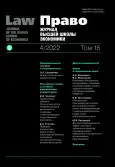Ensuring Favorable Conditions for Development of Single Market in Telecommunications and of the Audiovisual Media Services Sphere in the European Union
- Authors: Postnikova E.1
-
Affiliations:
- National Research University Higher School of Economics
- Issue: Vol 15, No 4 (2022)
- Pages: 184-209
- Section: Law in the Modern World
- URL: https://journal-vniispk.ru/2072-8166/article/view/318209
- DOI: https://doi.org/10.17323/2072-8166.2022.4.184.209
- ID: 318209
Cite item
Full Text
Abstract
The article presents the results of an analysis of some aspects of changing the legal regulation of the European Union (EU) in order to implement and develop the goal outlined in the Strategy of the Digital Single Market Strategy for Europe 2015 of creating favorable conditions for the development of digital networks and services as one of the three areas of activity for the creation of a single digital market. The purpose of the study is to identify the subject, features and trends of legal regulation of the single market in telecommunications and the sphere of audiovisual media services in order to create favorable conditions for the development of digital networks and services within the framework of the creation of a single digital market of the EU, including in pursuance of the Strategy, and, consequently, to increase the efficiency of the functioning of the EU internal market as a whole. The text of the Strategy itself is analyzed, as well as a number of both advisory and regulatory legal acts, including programmatic ones. For example, the regulations and directives adopted in pursuance of the Strategy, as well as the Communication of the Commission “Shaping Europe’s Digital Future “in 2020, the Communication of the Commission “Digital Compass: the European way for the Digital Decade “in 2021, the Regulation “Digital Europe Programme (2021–2027)”. The internalmarket plays a leading role in responding to a whole series of challenges that the EU has recently been facing. Among them is the acceleration of the introduction of new technologies that have a strong impact on both telecommunications and the audiovisual sphere, which in this regard are characterized by extremely rapid changes. It is concluded that much of the Commission’s planned Strategy in the field of Telecommunications and Audiovisual Media services has been fulfilled, but still all the goals have not yet been achieved. EU institutions are able to take a whole range of interrelated, consistent and extremely necessary measures in a short time to improve the legal regulation of the internal market, creating a single digital market. The relevance of the research topic is added by the fact that the Eurasian Economic Union is currently discussing the conclusion of an agreement in the field of regulation of electronic commerce.
About the authors
Elena Postnikova
National Research University Higher School of Economics
Email: noreply@hse.ru
ORCID iD: 0000-0002-5464-1132
Candidate of Sciences (Law), Associate Professor
References
- Boutayeb C. (2017) Droit matériel de l‘Union Eropéenne. Libertés de mouvement, espace de concurrence et secteur publique. LDGJ : Lextenso, 578 p.
- Craig P., de Búrca G. (1998) EU Law. Text, cases and materials. Oxford : University Press, 1152 p.
- Dony M. (2010) Droit de l'Union Européenne. Bruxelles: Universite, 763 p.
- Entin K.V. (2015) The law of the European Union and the practice of the Court of Justice of the European Union. Moscow: Norma, 240 p. (in Russ.)
- Ispolinov A.S. (2016) Precedent in the practice of the Court of Justice of the European Union. Mezhdunarodnoe pravosudie=International Justice, no. 3, pp. 64-77 (in Russ.) DOI:https://doi.org/10.21128/2226-2059-2016-3-64-77
- Kashkin S.Y. (ed.) (2014) Integration justice: essence and prospects. Moscow: Norma, 112 p. (in Russ.)
- Moiseev A.A. (2007) Supranationality in modern international law. Moscow: Nauchnaya kniga, 287 p. (in Russ.)
- Nikolaidis K., Schmidt S. (2007) Mutual recognition “on trial”: the long road to services liberalization. Journal of European Public Policy, no. 14 (5), pp. 717-734. DOI:https://doi.org/10.1080/13501760701427904
- Pilipenko A.N. (2019) France: towards digital democracy. Pravo. Zhurnal Vysshey shkoly ekonomiki=Law. Journal of the Higher School of Economics, vol. 12, no. 4, pp. 185-207 (in Russ.) DOI:https://doi.org/10.17323/2072-8166.2019.4.185.207
- Popova I.M. (2021) Mechanisms of the EU's influence on the international regulation of the digital economy. Vestnik mezhdunarodnyh organizaciy=Bulletin of International Organizations, v. 16, no. 3, pp. 256-272 (in Russ.) DOI:https://doi.org/10.17323/1996-7845-2021-03-12
- Revenko N.S. (2016) The European Union on its way to a single digital market. Mir novoy ekonomiki=World of the New Economy, no. 2, pp. 6-14 (in Russ.)
- Shishlov A.A. (2011) International legal regulation of electronic communications in the European Union. Candidate of Juridical Sciences Summary. Moscow, 26 p. (in Russ.)
- Talapina E.V. (2019) Digital transformation in France: legal innovations. Pravo. Zhurnal Vysshey shkoly ekonomiki=Law. Journal of the Higher School of Economics, vol. 12, no. 4, pp. 164-184 (in Russ.) DOI:https://doi.org/10.17323/2072-8166.2019.4.164.184
- Tridimas T. (2012) Precedent and the Court of Justice: A jurisprudence of doupt? In: Philosophical foundations of European Union Law. J. Dickson, P.Eleftheriadis (eds). Oxford: University Press, pp. 307-330. DOI:https://doi.org/10.1093/acprof:oso/9780199588770.003.0012
- Velikhova E.Ya. (2016) Legal regulation of the provision of telecommunications services (on the example of the legislation of the European Union and the Russian Federation). abstract. diss. Candidate of Juridical Sciences Summary. Moscow. 21 p. (in Russ.)
- Yumashev Y.M. (2015) Economic law of the European Union. Moscow: Norma, 382 p. (in Russ.)
Supplementary files








